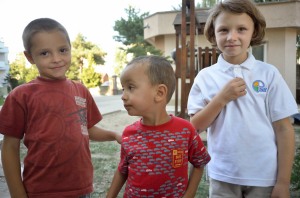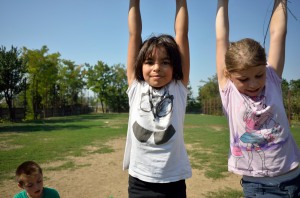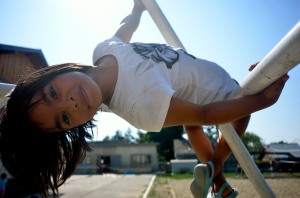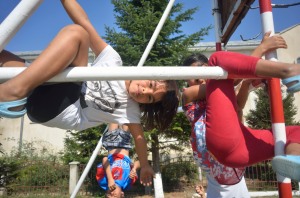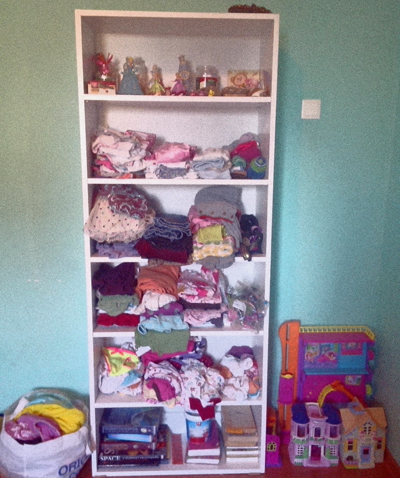A friend messaged me asking when it’s appropriate for us as believers to disobey the government. After writing way too much for just a Facebook message, I decided to put my thoughts here instead. Maybe it will be helpful for some of you as well. But before you read, let me give a disclaimer. Know that these are just my personal thoughts, mostly off the top of my head written down this morning without any real editing, but based on a lot of soul-searching, Bible study, and deep thinking recently. This is not the only way to think of things, but these are the conclusions I’ve come to, at least at this point in time, unless someone shows where I’m wrong in the Bible.
Without further ado…
While Romans 13 does clearly teach submission to governing authorities, even godless ones, it doesn’t teach obedience. The word used for submission is hupotasso, which means, literally, “to arrange yourself under.” From what I can tell, everywhere that this word is used in the New Testament, it means submission and never obedience. It’s essentially a heart attitude that says, “You’re the boss, not me.” This word is used to describe how all things were placed under Jesus’ feet (yet not all things obey Him just yet). It’s used to describe how when Jesus sent out the 70, they returned rejoicing that the demons were “subject” to them (yet one would have a hard time arguing that the demons unequivocally obeyed them, as they actually didn’t in Mark 9:29). Romans 8 and 10 use the word to describe a relationship between roles, one higher than the other. In 1 Corinthians 14:32, Paul says that the spirit of a prophet is “subject” to the prophet. Does this mean his spirit “obeys” him? No, it means his spirit is submitted to himself, so he can choose what to do with the prophetic things he hears – obey them or not. Verse 34 of the same chapter says that women should be “in submission” at church. Does this mean that when women come to church, they must obey whatever the leaders say? No, that would be an abuse of power. Over and over again, the word hupotasso is shown to mean an attitude of submission, an ordering of authority, but not necessarily obedience.
Contrasting that, the NT does have a word that is usually translated obey – hupokouo. This word literally means “to hear under” and carries a sense of really listening to the one speaking and then carrying out their orders. It’s used in the NT to talk about how children should obey their parents and slaves their masters, how the wind and waves obeyed Jesus in the storm at sea, how demons obeyed Jesus’ commands, etc. Jesus told the disciples that if they had faith like a mustard seed, they could tell the tree to be uprooted and it would obey, ie. that it would hear what they said and not just respectfully submit to their desires but actually do it, actually be cast into the sea. Acts 6, in talking about priests repenting and turning to Jesus in faith, it says they were “becoming obedient to the faith,” ie. they were hearing the Gospel and doing what it says. Romans 6:12 tells us not to let sin reign in us, that we would obey its passions. In the NT, this word always is used to imply hearing the command and completing it as desired.
The way I think of the two is that submission (hupotasso) is a heart attitude that says, “I respect you, I understand that you are in charge, I honor you and place you above me,” but obedience (hupokouo) goes further and says, “Not only do I recognize your place of priority over my life, but I will hear intently to what you say and do it.” The Bible never tells us to obey (hupokouo) governing authorities, but is very clear we must submit (hupotasso) to them. This means that there are times when we must respectfully, submissively disobey.
Church leaders taking Romans 13 and using it to mean we unquestionably obey the authorities is a cop-out and a misunderstanding of the teaching of the Bible. In addition to the way the Greek words are used, very clearly the NT church didn’t always obey the authorities. In Acts 4, the Council commands that Peter and John no longer preach. They say they will obey God rather than man. This happens again in Acts 5. They never stopped preaching. Then when their preaching caused problems with the Roman authorities, they didn’t stop there either. In history, we know that persecution got even more intense and churches were banned. But rather than surrendering, they obeyed God, met together in forests, caves, and catacombs. In later history, the church served as a voice of truth and opposition to the government, condemning abortion and infanticide even though it was a Roman law that deformed babies be killed, speaking against the gladiator fights, illegally working to free escaped slaves and end slavery (in the ancient world right up to modern times), working against the Nazis in Germany, speaking against authoritarian rule through the ages (in Medieval Europe, Communist Eastern Europe, European colonies, etc.), creating Constitutional restraints and limited government. So clearly there are times when the church, whether because of our obedience to God or our role to stand up for justice and righteousness, must submissively oppose the government.
Titus 3:1 says “Remind them to be submissive to rulers and authorities, to be obedient, to be ready for every good work.” This is another verse people bring up to support the idea that we should always obey government. There are a number of problems with this conclusion. First, it’s not clear from context that these “rulers and authorities” specifically refer to government. I think it’s likely they are referring to any authorities, in a general sense, which would of course include government but not be a specific statement about government itself. This is important, because the Bible elsewhere tells us to outright obey some authorities (slaves obey your masters, children obey your parents…) but to just submit to others (submit to governing authorities, wives submit to husbands…). Second, the word submissive is hupotasso, which (as stated earlier) doesn’t mean to obey but to respectfully submit. Then the word obedient is different. It’s the Greek word peitharcheo, which is used only 3 other times in the Bible. The word means “to be persuaded by what comes first, by a higher authority.” It’s the same word that the apostles use when they say they must obey God, not man in Acts 5. A few verses later, the word is used to say that God gives the Holy Spirit to those who obey Him (and by implication, not those who simply obey men). The last time it is used (besides here in Titus) is when Paul is on the prison ship to Rome. They encounter some funky weather, so Paul tells them they should wait it out at Crete. Instead, they continue on, and the weather gets worse, they run out of food, and Paul says, “You should have listened (peitharcheo) to me.” ie. “You should have been persuaded by me, one who had information from a Higher Authority.” Given how this same word is used to specifically show how Peter and John chose not to obey the authorities, it can’t mean complete and unequivocal obedience to authorities.
So… It seems to be the teaching of the Bible that we should always submit to our government authorities, but we must not always obey them. When do we choose not to obey them? When we are persuaded that there is a higher authority that conflicts with what they tell us to do, ie. when it goes against our conscience and our conviction based on the Word of God. We don’t get to disobey out of selfish reasons, or simply because the law is inconvenient or we don’t like it, but we do have an obligation to disobey government so that we can obey God or so we can stand against an injustice or protect the innocent. To be clear, this does not mean we should ever resort to violence, intimidation, or other such tactics, but that we can and should peacefully resist at times.
Right now, honestly, I see most churches just quietly obeying what the government says, but I think this is very dangerous. There is the injustice of what is happening – closing down businesses, ruining livelihoods, unilaterally expanding the powers of governors, disrespecting the right of private property, invading privacy, stirring up panic and fear, abusing personal freedoms. These are real issues of injustice that the church should not agree to without strong arguments that they are necessary as well as clear conditions and limits placed on these actions. People are being hurt by our government’s heavy-handed actions, and the church is largely supportive. This concerns me. What will happen when this virus is gone and another one comes? What will happen when there is a different crisis that emerges? What is to stop the government from continuing these injustices indefinitely? If they can abuse our God-given rights now, what will stop them from abusing them even further? What will stop a selfish, misguided government from using these powers in an even more abusive way in the future?
Besides the issues of injustice and abuse of power, there is the real question of whether we should obey the Word of God or what our government says. The Word of God is clear that we must not forsake the assembling of the saints (Heb 10:25). Streaming services can transfer information and provide a level of fellowship, but it is not the same as the saints coming together. If anyone had a reason to stop meeting together, it was the early church – government persecution, Jewish persecution, they were illegal, they were unpatriotic (because they didn’t worship Caesar), they were a nuisance despised by their neighbors, and there were a number of disastrous plagues in the first centuries AD that would be spread in their gatherings – but they didn’t stop meeting, only sending letters to each other. They found alternative ways to meet – in homes, the woods, caves, the catacombs, etc. If the early church still kept meeting, why wouldn’t we? The word used in Hebrews 10:25 about meeting together is used only one other place in the Bible, for when we will be gathered together with Jesus at the end of the age. We’re not gonna gather together with Jesus over Zoom. We will really be with Him physically. The saints just can’t gather together as the Bible expects unless they actually physically gather together.
In addition, the Bible calls us to lay hands on the sick, to lay hands on new leaders, to greet one another with a holy kiss, to take communion, to share meals, to baptize new believers in water, etc. I don’t expect that we have to follow all of these literally (I don’t want anyone kissing me at church!), but none of this can be done over Zoom or live-streaming our services. How can we weep with those who weep, rejoice with those who rejoice, and bear one another’s burdens if we aren’t in close enough contact with one another to do that? There is a personal, intimate side of Christianity that we can’t just get rid of because of an epidemic. I know most churches in America have transformed the whole idea of the church to be an event where we watch some people play music, watch a speaker share his thoughts, and then move on, but that isn’t what the Bible says. If the church was nothing more than just watching some music and teaching, then, yeah, fine, go ahead and do live-streaming and call it good. But the Bible’s vision of the church is very different, and I personally just can’t surrender on that point.
So at our church, we’ve been pursuing a route that allows us to respectfully submit to the spirit of the governor’s orders while remaining obedient to the Word of God. We still are physically meeting together, though in smaller groups. We’re washing our hands, we’re limiting our contacts and movements, we’re keeping an eye on our health, we’re requesting sick people stay home and call for the elders to pray for them as James said, and we’re being clear that anyone who feels concerned should be free to stay home… but we’re not going to keel over and stop meeting as the Bible expects just because that’s what the government wants. And I’m not going to stop speaking out against the growing injustice and tyranny I see around us. Nor will I be quiet about all the lies, manipulation of facts, fear-mongering, and panic that has gripped our society. And, yes, I plan to attend at least one of the upcoming protests.
You might find some of my recent sermons helpful:
“A Bigger Vision of the Church” series
“Faith Over Fear, Peace Over Panic – My Response to the Coronavirus”









